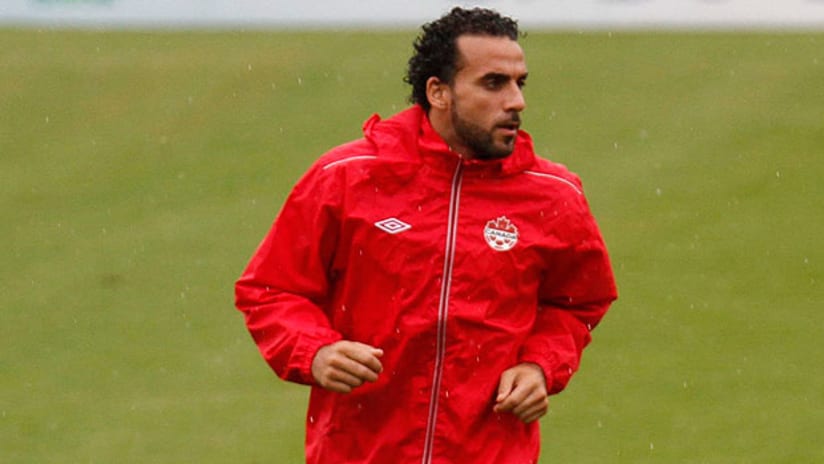There was a man from Scarborough, and DeRo was his name-o…
There’s never been a Canadian soccer player as prolific, as exhilarating and as polarizing as Dwayne De Rosario. And there may never be one again.
He was the sort of player that Canadian soccer fans constantly and desperately yearn for — flashy, confident, full of swagger and above all, eminently capable of putting the ball in the back of the net on a whim.
The general stereotype of Canadians is that we’re polite to a fault. Meek, even. When it comes to Canadian soccer on the world stage, those traits are usually amplified — we don’t want to rock the boat, after all. We’ll just take what you’re willing to give us, thanks very much, sorry for bothering you.
DeRo broke the mold. DeRo knew how to take the game by the horns. DeRo was a champion.
For those who dare to rock the boat, there come the skeptics. The cynics. Those who desire nothing more than to see the renegade fall from their perch. Such is, and was, the case for De Rosario.
His numbers are undeniable. He retires as the all-time leading scorer for both the men’s national team and his hometown club, Toronto FC. He’s sixth in all-time MLS goals, a seven-time MLS all-star and a four-time MLS champion.
No Canadian male player has ever been as dominant a force — for as long a period — as DeRo was. He’s not just one of the best Canadian players of all time, he is one of the best MLS players of all time. Period.
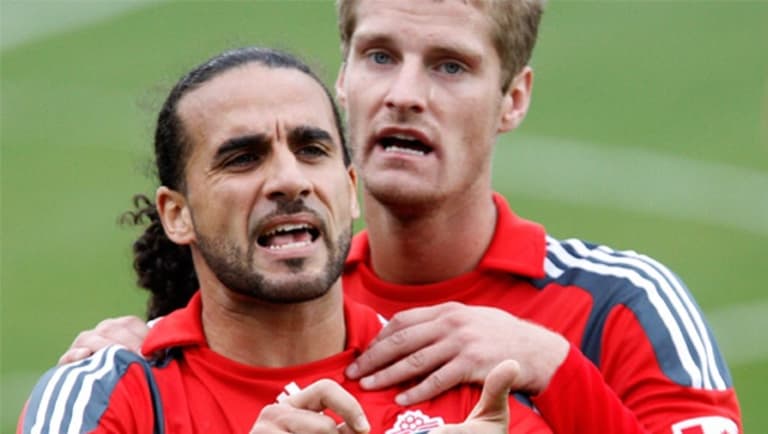
Yet, in Canada — where our small, fractured soccer community loves nothing more than to make itself even smaller and more fractured — he is not greeted with universal praise. To many, he isn’t a trailblazing pioneer, a local boy made good for his hometown club. Instead, he is “MeRo.”
The MeRo caricature is needlessly brash, greedy on the field of play. This character fell way short of expectations for the national team, showing up only when it suited him. MeRo is concerned only with himself, as encapsulated perfectly by the check-signing motion in a goal celebration (pictured above) that signaled the beginning of the end of his first stint with TFC.
For some, these perceived character traits are sufficient to dismiss the man’s accomplishments. There’s no separating what was from what could have been if only the universe had lined up in some alternate arrangement. If only…
But, then, there is no separating the person from the player. There never is. Would a person with a different personality have produced the same results as a player? It’s impossible to know. All we do know is that De Rosario — the person, the player and the inextricably intertwined combination thereof — produced a soccer-playing career that is unlikely to be replicated for a long time.
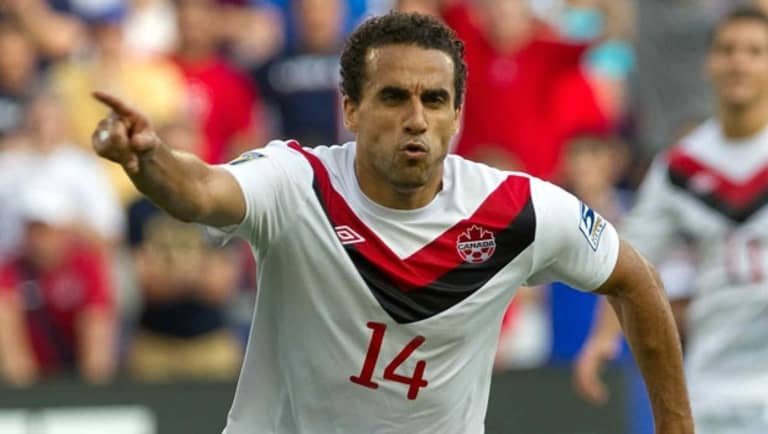
And while his statistics will remain unassailable for a good while, his more enduring legacy will be in the hearts and minds of a new generation of Canadian footballers.
In the age of all-sports television networks, on-demand streaming and ubiquitous athletic content, where every move is under a microscope, De Rosario has been the male face of Canadian soccer.
In him, Canadian fans saw what they rarely see from their countrymen: A player who could score goals for fun, and who clearly had fun doing it. His trademark “shake and bake” celebration has doubtless been replicated countless times on small-sided fields across the country.
And in him, fans saw a proud Canadian who nevertheless had pride in his ancestral roots and who knew the importance of reaching out to Toronto’s various communities through sport. Surely, this—along with his various charitable initiatives over the years—played heavily in the decision by Maple Leaf Sports and Entertainment to provide him with a new role as ambassador.
The reality is, of course, DeRo has been an ambassador for Canadian soccer for years. And while he’s unlikely to receive a fraction of the fanfare that Landon Donovan did during his farewell tour, it’s no stretch to say De Rosario’s impact on Canadian soccer was comparable to Donovan’s impact down south.
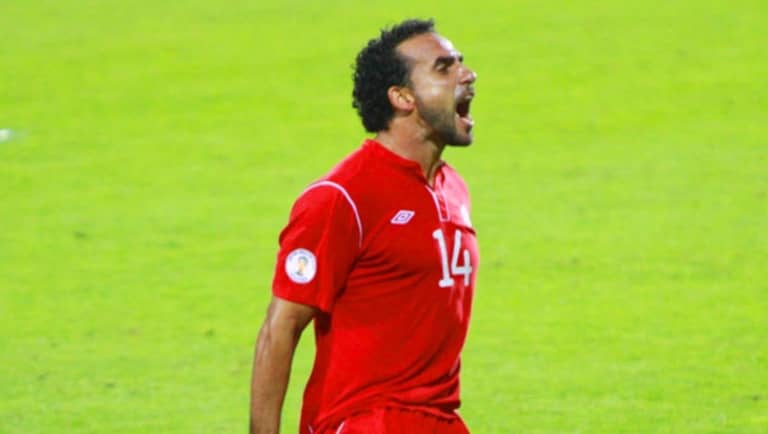
De Rosario never got to experience a defining World Cup moment of his own. But he did provide those who watched him with plenty of enduring memories.
The first goal I ever saw him score live came at BMO Field on Sept. 12, 2007. The energy in the newly-opened stadium was palpable, yet conflicted. Toronto was hosting its first men’s national team game in a decade — a friendly against Costa Rica — and several hundred fans in the south end were marking the occasion by staging a protest against the Canadian Soccer Association.
But the anger my colleagues in the south stands felt on that day was dissipated, at least temporarily, in the 54th minute. With the hosts down 1-0, DeRo controlled a cross in from the wing by Julian de Guzman and unleashed an absolute rocket from his left foot.
It opened my eyes to what could be for Canadian soccer — and I’m sure I wasn’t alone.
DeRo would go on to score plenty more goals at that stadium, for both club and country. While perhaps none were as pretty as that strike against Costa Rica, each had the same potential effect on untold numbers of people in attendance: Grand ideas about what Canadian soccer could be; about what a Canadian soccer player could be.
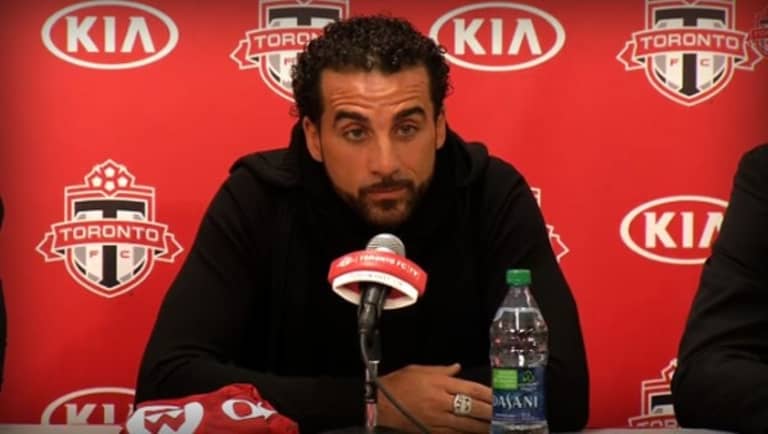
DeRo never achieved his dream of leading Canada back to the World Cup. But by virtue of doing what he did for so many years, there’s a very good chance he’s helped inspire the generation of players who might finally reach that plateau.
Was Dwayne De Rosario the “best” male player to ever suit up for Canada? That debate will surely rage, disintegrating into the same arguments over semantics and statistics that such subjective discussions always do.
But in the end, he had the sort of career of which most soccer players — of any nationality — can only dream. And he did it his way, the only way he knew how: as the one and only DeRo.

